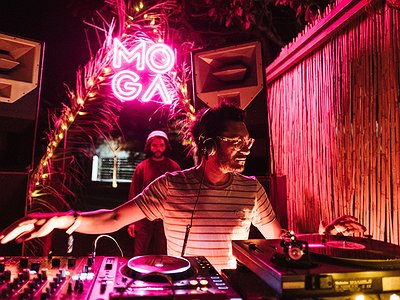Part 1
Name: Guedra Guedra
Nationality: Moroccan
Occupation: DJ, producer
Current release: Guedra Guedra is part of the line-up of the Moga Essaouira festival which will take place October 4-8th, 2023 in Essaouira, Morocco. Other artists to perform at the event include A Guy Called Gerald, Jayda G, Fumiya Tanaka, Malika, Margaret Dygas, Maayan Nidam, Peach, Portable, and Prins Thomas. For tickets head to https://www.mogafestival.com/. His album Vexillology is out via On the Corner.
Recommendations: People may already be familiar with them, but if you ask me for two pieces of art, I would say:
Music: "Piano Phase" by Steve Reich
Book: "Lines: A Brief History" by Tim Ingold.
[Read our Prins Thomas interview]
If you enjoyed this Guedra Guedra interview and would like to stay up to date with his music, visit him on Instagram, Facebook, and Soundcloud.
When I listen to music, I see shapes, objects and colours. What happens in your body when you're listening? Do you listen with your eyes open or closed?
For me, the aesthetics of listening are of great importance. I make a distinction between "hearing" and "listening," as listening, to me, is an aesthetic, sensitive, and critical experience.
As a sound artist and music producer, my approach revolves around the dimension of listening. My sensitivity, imagination, and way of engaging with the world find expression through this faculty of listening. My artistic practice aims to evoke sensory experiences that invite contemplation, utilizing the sonic potential of the world to foster deep introspection.
To me, space is a fundamental element. The environment encompasses not only the physical space surrounding an individual but also the entirety of the physical and relational conditions within which this individual exists.
Imagination holds a paramount place in my artistic vision. I regard imagination as a mental space, a realm where the invisible can be conceived. The act of imagining possesses a dynamic energy far more potent than mere vision.
Regarding listening, both approaches, whether with eyes open or closed, offer distinct experiences. I often employ both methods of listening to construct a sonic imagination. Eyes open afford me the ability to remain grounded in the visual environment, while closed eyes assist me in delving deeply into the sonic landscape, facilitating a more immersive and introspective experience.
What were your very first steps in music like and how would you rate the gains made through experience - can one train/learn being an artist?
My journey and experience in the field of music have undergone a significant evolution over more than two decades.
My initial steps were as a musician, involved in various groups spanning diverse musical styles. Throughout the years, this experience deepened as I transitioned to become a producer and sound artist. Each year and phase of my musical journey has contributed to the development of new approaches, whether in terms of my perspective on music creation, personal research, or sound production process.
My experience as a musician has allowed me to navigate the nuances and challenges inherent in different musical genres. Each style has offered a unique palette of expressions and techniques, thus enriching my overall understanding of music. Transitioning from the role of musician to producer and performer expanded my horizons as I delved into the technical aspects of sound creation. This drove me to deepen my knowledge in arrangement, production, and sound manipulation.
The accumulation of this experience has led to a constant growth in my ability to create and express musically. Each new stage has brought tangible gains, whether in my capacity to convey emotions through music, experiment with new sounds, or innovate in my production.
According to scientific studies, we make our deepest and most incisive musical experiences between the ages of 13-16. What did music mean to you at that age and what’s changed since then?
My musical journey has been shaped by a music-rich environment from a young age. During this time, I was exposed to a diverse musical culture that helped shape my preferences and open-mindedness towards different styles. My earliest encounters with musical instruments sparked my curiosity and marked the beginning of my musical journey.
Throughout my adolescence, I had the opportunity to explore a wide variety of musical genres. Each phase of my life was accompanied by immersion in different sounds, greatly enriching my musical perspective. What has evolved since then is a deeper involvement in music. My connection with music transitioned from mere appreciation to a genuine passion and creative engagement.
Now, music not only brightens my life, but it's also an integral part of my creativity and personal expression. The pursuit of ways to create sounds rooted in my culture and context has become a central aspect of my musical practice.
What, would you say, are the key ideas behind your approach to music and what motivates you to create?
My musical approach with Guedra Guedra is not built upon a single key idea, but rather on a conceptual foundation that guides a structured production process. Each project starts with in-depth exploration and a research phase. This process, grounded in a robust methodology, gives rise to a coherent artistic vision.
What drives my creation is the belief that the modern audience expects more from music than mere entertainment. Listeners are seeking artistic projects that provoke profound questions and reflections. This shift towards an intellectually engaged audience inspires my projects and compels me to create thoughtfully and meaningfully.
To quote a question by the great Bruce Duffie: When you come up with a musical idea, have you created the idea or have you discovered the idea?
In my approach to music production, a crucial step involves meticulous research in archives, rhythms, and field recording recordings. It is during this phase that new compositions emerge, and it is fair to say that I uncover rather than create these musical ideas.
My approach leads me to believe that my musical ideas are more discoveries than purely original creations. My process aligns with the notion that music is already inherently present in the sound elements around me, and my role is to unveil and highlight them.
Paul Simon said “the way that I listen to my own records is not for the chords or the lyrics - my first impression is of the overall sound.” What's your own take on that and how would you define your personal sound?
To be honest, I firmly believe that the act of listening can truly foster a sensitive relationship between the individual, their environment, and their state of mind. The aesthetics of listening transcend repetition, as one can never hear the same sound in the same way multiple times. To me, each instance of listening represents a new experience to be lived and a fresh way to interpret the sound itself.
Paul Simon emphasized that when he listens to his own recordings, his initial impression is of the overall sound rather than the chords or lyrics. I share this viewpoint. When I create music, my attention often focuses on the overall sonic texture, how the elements intertwine to craft a unique auditory experience.
To define my own personal sound, I regard it as a fusion of my artistic sensibility, worldview, and cultural heritage. My approach integrates elements of the aesthetics of listening, as each composition and performance evoke a variety of emotions and interpretations as I listen to them. My sound is in constant evolution, mirroring my experiences and growth as a sound artist.
Ultimately, deep listening and sonic aesthetics play a pivotal role in my relationship with music. Each act of listening brings a fresh and unique perspective, just as my own musical expression continues to evolve in capturing the ever-changing essence of my artistic and personal journey.
Sound, song, and rhythm are all around us, from animal noises to the waves of the ocean. What, if any, are some of the most moving experiences you've had with these non-human-made sounds? And how far would you describe them as “musical”?
The concept of soundscape, as described by Murray Schafer, encompasses the composition of a sonic landscape through an aesthetic, historical, geographical, and cultural lens.
Nature itself can be considered a vast "musical composition" to be harmonized by highlighting natural sounds.
The most moving experiences I've had with these non-human created sounds have primarily occurred when I've listened to the world through various sound-capturing tools, such as acoustic microphones, hydrophones, electromagnetic sensors, binaural and mono recordings, and more.
These tools have allowed me to perceive the world in ways different from those perceived by the human ear alone. By listening to the world with these devices, I've been captivated by sounds I could never have grasped otherwise. Birdsong, rustling leaves, ocean waves—all these sounds take on a new dimension, revealing a hidden symphony woven into the fabric of nature itself.
I consider these experiences "musical" in the sense that they present elements of composition and structure that evoke emotions similar to those of traditional music. The rhythmic patterns, natural melodies, and complex sonic textures found in these non-human sounds create an organic harmony that resonates with our senses in a profound and powerful way.






